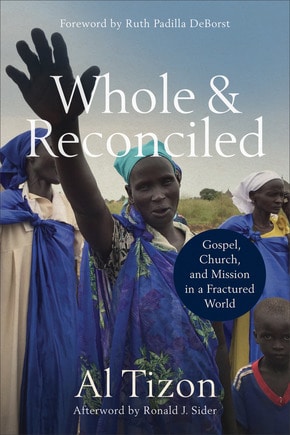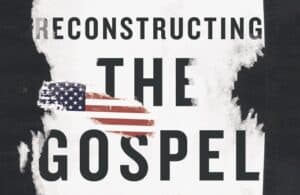
I wish that the words “gospel,” “church,” and “mission” had no need of additional adjectives to convey their compelling truths. I wish that when outsiders heard these words, they would imagine a community of ordinary but loving people who shine the light of God in a darkened world (Matthew 5:16). I wish these words would evoke an image of people who, by virtue of their claim to follow a revolutionary named Jesus, are living out peace, justice, freedom, and love for the good of the community and are announcing God’s message of hope for a better world. I wish.
That “gospel,” “church,” and “mission” do not conjure up these kinds of images, that many of these words represent quite the opposite—a community marred by a colonial past, along with an intolerant, paternalistic, even scandalous reputation in the present—is profoundly disturbing. Although these awful descriptors do not tell the whole story, we as Christians would be foolish to become too defensive; for an honest critique of the church’s past (and present, for that matter) would uncover a multitude of tragic sins in need of radical forgiveness.
So much evil has been done in the name of Jesus that, for some, the words “gospel,” “church,” and “mission” are beyond redemption. For those, however, who can see through (not past) the evil side of Christian history, for those who continue to take biblical teaching seriously, for those who can still see the good in the gospel, the relevance of the church, and the necessity of mission, it is not optional or desirable to abandon these words. Because of the church’s less-than-shiny witness, these words need something, though—perhaps an adjective such as “whole”—to help restore their reputation or at least enable us to have intelligent, nondefensive conversations about God and God’s mission.
Perhaps the language of “whole” can help recover the beauty and power of the truth that God so loved the world that Jesus pitched his tent among us to communicate that love personally and profoundly (John 1:14; 3:16–17). If, for example, the Lausanne Movement’s slogan, “The whole church taking the whole gospel to the whole world,” helps God’s people embrace both evangelism and justice, then by all means let us use “whole” to the fullest. “The divided church taking half the gospel to select parts of the world” may be more accurate, but it is not a very compelling slogan! Nor does it convey where we want to stay.
The New Whole in Holistic Mission
Those in touch with the debates in the last century over the nature of the Christian mission know that the language of “whole” has indeed been used at various times precisely to recover the glory of gospel, church, and mission. I have a growing sense of the need to rethink what it means to engage in holistic mission, and of the need for a new kind of whole.
We find ourselves living amid massive global changes, and contrary to the notion that holistic mission was forever settled and defined by the raging debates of the last hundred years concerning the relationship between evangelism and social concern, it is a dynamic reality that needs fresh formulations according to an ever-changing world. Indeed, a church that seeks to share good news amid increasingly volatile times faces new missional challenges.
…contrary to the notion that holistic mission was forever settled and defined by the raging debates of the last hundred years concerning the relationship between evangelism and social concern, it is a dynamic reality that needs fresh formulations according to an ever-changing world.
In our diversifying, globalizing, and increasingly fracturing world, I have found it vitally important to consider the ministry of reconciliation as central to a contemporary understanding and practice of mission. I join others who have been urging the church to see reconciliation as the necessary paradigm of mission in the age of unprecedented global fragmentation.
Since the turn of the twenty-first century, reconciliation has received renewed attention among missiologists and missionaries. After describing the sociopolitical, economic, and cultural consequences of colonialism, as well as the ubiquitous, disorienting effects of globalization, Robert Schreiter, one of the first among those who can be called reconciliation theologians, writes, “It is out of this miasma of violence and division that the theme of reconciliation began to surface as a compelling response to all that was happening in terms of mission.”
I write this book, in part, simply to applaud this development and to reinforce the efforts of those who have seen the crucial importance of reconciliation as a way to think and do mission in today’s world. I seek to explore the depths of reconciliation from my theological location—namely, as an Asian American Christian within the context of the global evangelical journey toward holistic mission—and thus hopefully add to the conversation.
Historically, amid the infamous fundamentalist-modernist split in North American Protestantism, holistic mission has referred to efforts on the part of a group of courageous evangelicals who dared to challenge a myopic evangelism-only missiology. Their efforts sought to reintegrate social justice into the evangelical missionary agenda, to make whole again the mission of the church, especially but not exclusively among evangelicals around the world.
I see a great need to advance the meaning of holistic mission, to build on the evangelism and social justice affirmation, by understanding the ministry of reconciliation as the new whole in (w)holistic mission.
I see a great need to advance the meaning of holistic mission, to build on the evangelism and social justice affirmation, by understanding the ministry of reconciliation as the new whole in (w)holistic mission. In the age of intensified conflict on virtually every level, it can no longer be just about putting word and deed back together again (though it will take ongoing effort on the part of the church to keep them together); holistic mission also needs to be about joining God in putting the world back together again. It needs to be about participating with God in the healing of the nations.
 Al Tizon (PhD, Graduate Theological Union) is executive minister of Serve Globally, the international ministries arm of the Evangelical Covenant Church, and affiliate associate professor of missional and global leadership at North Park Theological Seminary in Chicago, Illinois. He previously taught at Palmer Theological Seminary, and served as co-president of Christians for Social Action. He is the author of Whole and Reconciled: Gospel, Church, and Mission in a Fractured World, from which this excerpt appears by permission.
Al Tizon (PhD, Graduate Theological Union) is executive minister of Serve Globally, the international ministries arm of the Evangelical Covenant Church, and affiliate associate professor of missional and global leadership at North Park Theological Seminary in Chicago, Illinois. He previously taught at Palmer Theological Seminary, and served as co-president of Christians for Social Action. He is the author of Whole and Reconciled: Gospel, Church, and Mission in a Fractured World, from which this excerpt appears by permission.


